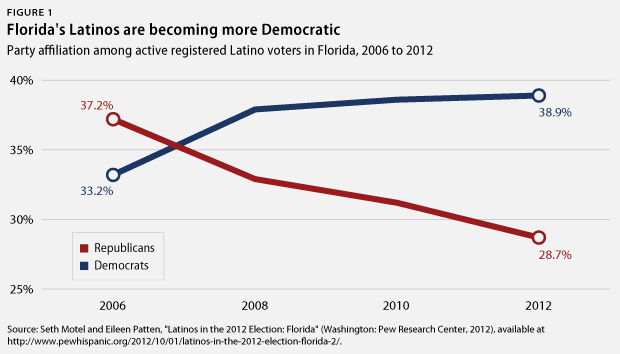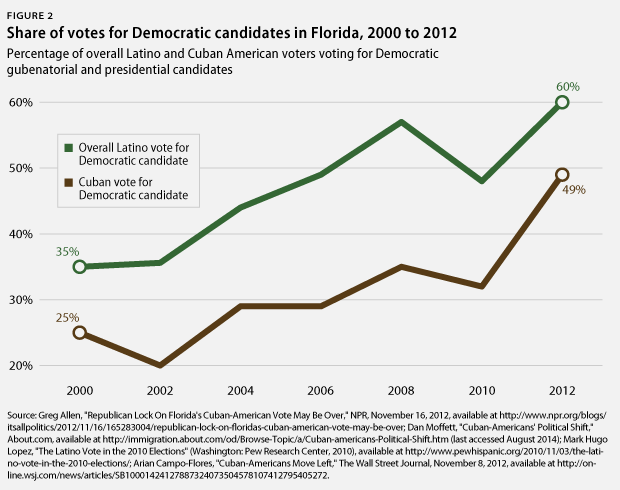This May, Florida became the latest state to pass DREAM Act legislation, allowing young undocumented immigrants to pay the same in-state college tuition rates as other Florida residents. In driving the bill toward passage in the Florida House of Representatives, Florida House Speaker Will Weatherford (R) single-handedly prevented his Republican colleagues from blocking a vote on the legislation—HB 851—by threatening to hold the state’s budget hostage until the Florida Senate allowed a floor vote on it.
Speaker Weatherford’s actions, coming only three years after Florida came dangerously close to passing an Arizona-style anti-immigrant bill—SB 2040—highlight the state’s political and demographic evolution. SB 2040 would have opened the door to racial profiling by requiring law enforcement to check the legal status of anyone they believed to be in the country without legal status. The fact that Florida could swing so rapidly from anti- to pro-immigrant legislation—and that a young conservative leader could be out in front of it—says a lot about how the state has changed over the past few years. Speaker Weatherford’s success should be recognized as a watershed moment for Florida’s immigration policy and as a bellwether that a segment of the Republican Party is finally fighting for the votes of a changing electorate.
Florida’s demographic shifts
Latino voters have played an increasingly important role in Florida’s elections over the past decade, with the Latino population in the state growing three times faster than in the country as a whole. Latinos now make up 13.9 percent of the voting public in Florida, and their growing prominence is a key reason for President Barack Obama’s victories there in 2008 and 2012. In fact, no presidential or gubernatorial candidate has won the state without also winning the Latino vote since 1998.
While Latino voters are growing as a share of the overall Florida electorate, perhaps more significant is the fact that they are increasingly identifying with the Democratic Party. In 2006, a plurality of Latino voters in Florida still affiliated with the Republican Party. (see Figure 1) By 2012, however, Democratic affiliation among Latinos topped Republican affiliation by more than 10 percent—a 14-point uptick.

Despite these trends, old arguments persist about Florida being an exception to the rule of Latino voting given the state’s large Cuban population—a group that has historically voted Republican. However, just as Florida’s overall Latino population has become more Democratic, so too have the state’s Cuban Americans. (see Figure 2) Whereas a full 78 percent of Cubans in Florida voted for former President George W. Bush in 2004, in 2012, President Obama became the first Democratic candidate to win the state’s Cuban vote in a generation.
As Florida voters become more and more demographically Latino with each election cycle, they are leaning more toward Democrats—and away from Republicans.

A legislative turnaround on immigration
What do these shifting political views have to do with immigration beliefs? An overwhelming majority of Florida’s Latino voters believe that immigration policy is an important electoral issue, with a full 27 percent indicating that it is their most important consideration. Immigration is also personal: 49 percent of Latino voters in Florida report that they know an undocumented immigrant, and 91 percent support the passage of the DREAM Act.
Furthermore, DREAMer activists have only amplified the call for positive immigration action in Florida over the past few years. Advocacy leaders such as María Rodriguez of the Florida Immigrant Coalition and Gaby Pacheco, co-founder of United We Dream, have led the charge to pass the DREAM Act. With the support of the American Civil Liberties Union, their organizations were able to gather more than 18,000 signatures on a petition supporting the Florida DREAM Act. They did not stop there, continuing to press for action on the bill even in the waning days of the legislative session with demonstrations in the state capital’s rotunda that demanded “education for all.” Among the most emotional stories were those of DREAMers who talked about their struggle to pay for college.
Ultimately, their lobbying efforts paid off: Within days of speaking with long-time immigrant activist Margarita Romo, Speaker Weatherford drafted a Tampa Bay Times op-ed calling for tuition reform, put tuition equity at the top of his legislative agenda, and set about securing a vote for the act.
With the changing electoral demographics, clear Latino views on immigration, and DREAMer activism, Republicans in the state have finally begun to get the message. In 2010, Florida was among a host of Tea Party-swept states looking to enact anti-immigrant legislation, including the criminalization of any movement within the state without proof-of-citizenship documentation. In 2011, the legislature debated a series of bills forcing local law enforcement to turn over all undocumented detainees to U.S. Immigration and Customs Enforcement. Today, the state is considering Trust Act measures that would bar Florida from honoring federal requests to detain undocumented immigrants unless they have been convicted of a serious crime.
Florida Gov. Rick Scott (R) is living proof of this turnaround: During his 2010 gubernatorial campaign, he ran ads that supported Arizona’s anti-immigrant law—SB 1070—and promised to bring it to Florida. This year, Gov. Scott signed the state’s DREAM Act into law, even going so far as to celebrate the achievement.
Conclusion
Despite maintaining a Republican majority in the legislature, Florida fits into a growing category of states across the country that have demonstrated an about-face on immigration issues over the past few years. Florida Republicans—from former Gov. Jeb Bush to Gov. Scott and those in the legislature—are signaling a policy shift as they look into the political reality of a changed electorate and an unrelenting advocacy community. Florida offers a reform model for other states to follow: Harness the growing power of the Latino vote and act on common-sense pro-immigration policies.
Zach Fields is an intern with the Immigration team at the Center for American Progress.